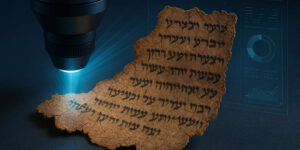Swearing In on the Bible vs. Quran: What Would Our Founders Say?
Rashida Tlaib, the new Congresswoman from Michigan, took the oath of office with her hand on a copy of the Quran. She then commented that “some of our Founding Fathers knew more about Islam than some members of Congress now,” which was probably a reference to Thomas Jefferson, who owned a copy of the Quran.
Tlaib is not the first to depart from the tradition established by the founders and use a religious book other than the Bible for taking the oath of office. In 2007, Keith Ellison, the first Muslim member of Congress, also chose to be sworn into Congress with his hand on a Quran.
What would America’s founders think of this break from the tradition they established? Would they be indifferent about it? Or would they be concerned?
A 10-year project instituted to discover where the Founding Fathers got their ideas for America’s founding documents found that by far the single most cited authority in their writings was the Bible. They seldom, if ever, quoted from the Quran. They were children of the Reformation, and the Bible was their primary guide for life and the standard they used for measuring all other writings, both ancient and modern.
Indeed, the First Continental Congress was opened with an extended time of Bible reading and prayer. And when George Washington placed his hand on a Bible and took the oath of office as America’s first president, it was no mere formality. It was an expression of his commitment to the Bible as the ultimate source of guidance and authority for his administration.
Jefferson, after reading and comparing the Quran and other writings with the Gospels, wrote, “Of all the systems of morality that have come under my observations, none appear to me so pure as that of Jesus.” He not only took the oath of office with his hand on a Bible, he closed all presidential documents with the appellation, “In the year of our Lord Christ.”
The founders understood the power of values and belief systems in a way that most Americans today do not. They were convinced that only the Bible—centered in Jesus—offered a belief system and set of values that would sustain the free republic they had brought into existence.
Washington affirmed this when he said, “It is impossible to rightly govern the world without God and the Bible.” It was respect for the Bible as a guide for life and liberty that led James Madison, while president, to sign a federal bill in 1812 that provided economic aid for a Bible society in its goal of the mass distribution of the Bible (Hyatt, Pilgrims and Patriots, 145).
The founders’ respect for the Bible was highlighted when the first English Bible printed in America in 1782 included a recommendation from Congress. The producer of the Bible, Robert Aitken, had written a letter to Congress in which he asked for that government body’s sanction on his work. In the letter, Aitken called this Bible, “a neat Edition of the Scriptures for the use in schools.”
Congress enthusiastically responded to his request and offered the following recommendation to be included in this first English Bible printed in America:
Resolved: That the United States in Congress assembled, highly approve the pious and laudable undertaking of Mr. Aitken, as subservient to the interest of religion as well as an instance of the progress of the arts in this country, and being satisfied from the above report, of his care and accuracy in the execution of the work they recommend this edition of the Bible to the inhabitants of the United States and hereby authorize him to publish this recommendation in the manner he shall think proper.
The founders lived at a time when the European Enlightenment and its emphasis on reason was drawing many on the European continent away from the Bible. America’s founders, however, saw no dichotomy between the Bible and reason. The well-known Catholic scholar, William Novak, says,
Everywhere that reason led, Americans found the Bible. If they read Francis Bacon, they found the Bible. If they read Isaac Newton or John Milton, they found the Bible. In Shakespeare, they found the Bible. In the world of the founders, the Bible was an unavoidable and useful rod of measurement, a stimulus to intellectual innovation (Hyatt, Pillars of the American Republic, 16).
This primary role of the Bible in America’s founding was acknowledged by Andrew Jackson, America’s seventh president, when he declared, “That book, sir, is the rock on which our Republic rests.” It was also confirmed by the 26th president, Theodore Roosevelt, who said, “No other book of any kind ever written English has ever so affected the whole life of a people.”
America’s founders were tolerant of non-Christians, not because they were indifferent, but because it is what Jesus taught. They were tolerant also because they believed in the power of the Christian message. They believed that, if given a level playing field, the truth of Christianity would prevail. Jefferson declared,
Truth can stand by itself … If there be but one right religion and Christianity that one, we should wish to see the nine hundred and ninety-nine wandering sects gathered into the fold of truth. But against such a majority we cannot effect this by force. Reason and persuasion are the only practicable instruments. To make way for these, free inquiry must be indulged; and how can we wish others to indulge it while we refuse it ourselves.
Nations derive their values primarily from religion. Countries such as Saudi Arabia, Iran, Iraq, Afghanistan, Pakistan and Syria have derived their values from the Quran and Islam. The oppression and lack of individual freedom in those nations is obvious to all. Why then would anyone want to bring those same values to America?
America’s founders believed that only Christianity provided the moral and intellectual underpinnings for a stable and prosperous nation. They would, therefore, be very concerned with someone taking the oath of office with their hand on a Quran, which they would see as an expression of allegiance to that book.
Yes, America was founded on biblical values. It is time, therefore, for a “Back to the Bible” movement that will reeducate Americans, beginning with the church, as to what the Bible actually teaches and the role it played in the founding of America. {eoa}
Dr. Eddie Hyatt has written several books on America’s Christian origins, and they are available from Amazon and his website at eddiehyatt.com. He also conducts “America Reawakening” events, an inspiring PowerPoint presentation that documents how America was birthed out of a great spiritual awakening and a Christian worldview.




























































